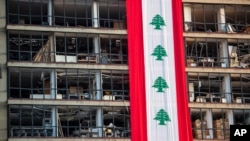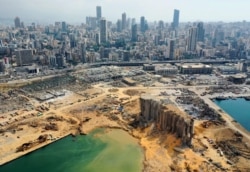The U.N. Development Program warns widespread systematic corruption and lack of accountability in Lebanon will impede Beirut’s efforts to recover from the August 4 blast that has devastated the lives and livelihoods of hundreds of thousands of people.
A special report by the UNDP describes how deeply the rot has penetrated Lebanese society. At the Port of Beirut alone, the report finds lack of accountability has resulted in a financial deficit of nearly $800 million a year. It says the overall estimate of the annual cost of corruption is expected to be well over $1 billion.
Arkan El Seblani, the chief of UNDP’s Anti-Corruption and Integrity unit for Arab States, says corruption permeates the whole society and carries a huge cost.
“According to some estimates, the cost of corruption in Lebanon is equal to $5 billion a year. So, putting that number in perspective, it is about nine percent of the country’s GDP. And this is only the direct cost and does not include indirect costs, opportunity costs and also the social costs in terms of the health and well-being of citizens,” he said.
The explosion at the Port of Beirut has resulted in deep human suffering. Critics blame the devastating blast on corruption and negligence. They note authorities had repeatedly dismissed warnings to remove the tons of explosive ammonium nitrate, which was stored in unsafe conditions at the seaport warehouse.
El Seblani says who exactly is to blame for the explosion may never be known. However, he says lack of accountability for this catastrophe is likely to have an impact on response and recovery efforts. He says it is likely to dissuade international donors from funding the city’s rehabilitation needs.
“Leakage and embezzlement of money and goods, bribes and kickbacks in construction projects, as well as political co-optation of related efforts are all real and present in the context of Lebanon. And, this is not only limited to resources through the government institutions,” he said.
El Seblani notes the corrupt networks that have infiltrated the public sector over the years also have set up their own organizations and alliances in the private sector and even in civil society.
The government adopted the country’s first-ever national anti-corruption strategy in May. El Seblani says UNDP will work to see that provisions in the strategy are implemented. These include stronger anti-corruption laws and ensuring the independence and effectiveness of the judiciary and of oversight bodies.










